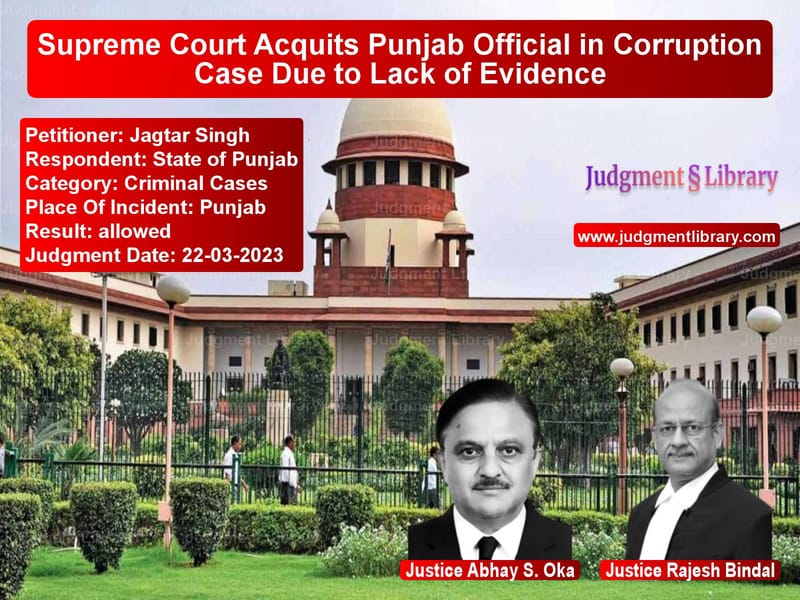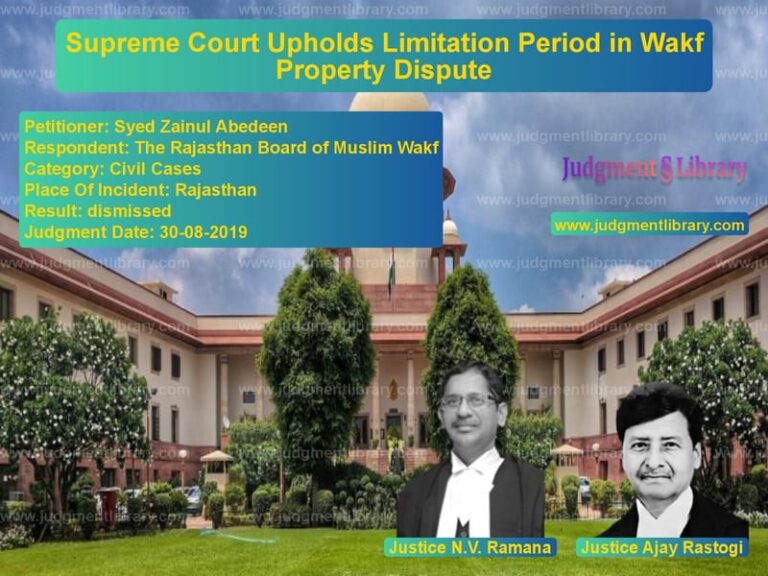Supreme Court Acquits Punjab Official in Corruption Case Due to Lack of Evidence
The Supreme Court of India recently delivered a significant ruling in the case of Jagtar Singh v. State of Punjab, where it set aside the conviction of the appellant under the Prevention of Corruption Act, 1988. The case revolved around allegations that Jagtar Singh, a public servant, had demanded and accepted an illegal gratification of ₹300 for providing a death certificate.
The Supreme Court acquitted the appellant, ruling that both demand and acceptance of bribe must be proven beyond reasonable doubt for conviction under the Prevention of Corruption Act. This ruling reinforces the principle that mere recovery of money is not enough to convict an accused unless it is accompanied by proof of demand.
Background of the Case
The case originated when Ranjit Singh sought to obtain a death certificate for his father, Maghar Singh. He requested his cousin, Jit Singh, to collect the certificate. On October 17, 2003, Jit Singh met Jagtar Singh, the appellant, who allegedly demanded ₹500 for the certificate but later agreed to accept ₹300.
Unwilling to pay a bribe, Jit Singh reported the matter to Chamkaur Singh, an Ex-Member of Panchayat, who advised him to approach the Vigilance Department. A trap was set up by the Deputy Superintendent of Police (DSP), and Jagtar Singh was allegedly caught red-handed while accepting ₹300, which had been coated with phenolphthalein powder.
Trial Court Conviction and High Court’s Ruling
The Trial Court convicted Jagtar Singh based on the recovery of the bribe amount and sentenced him under the Prevention of Corruption Act. The Punjab and Haryana High Court upheld this conviction in 2010, dismissing his appeal.
The appellant then approached the Supreme Court, arguing that there was no direct evidence of him demanding a bribe and that the case was solely based on the recovery of money, which was insufficient for conviction.
Arguments of the Parties
Petitioner’s Arguments (Jagtar Singh)
- There was no direct evidence to prove that he had demanded a bribe.
- Both Jit Singh (complainant) and Chamkaur Singh (shadow witness) turned hostile during the trial and did not support the prosecution’s case.
- The appellant was merely working as a cleaner in the Civil Surgeon’s office and had no authority to issue or deliver death certificates.
- Since the certificate in question was prepared before the appellant was assigned any related duties, it was unlikely that he could have facilitated its issuance in exchange for money.
- Mere recovery of money is not sufficient to prove guilt under the Prevention of Corruption Act unless there is clear evidence of demand and acceptance.
Respondent’s Arguments (State of Punjab)
- Since the phenolphthalein-coated notes were recovered from the appellant, it was reasonable to infer that he had demanded and accepted a bribe.
- The trial court and the High Court had correctly convicted him based on circumstantial evidence.
- The prosecution had followed all proper procedures in laying the trap and conducting the investigation.
Key Observations of the Supreme Court
The Supreme Court carefully analyzed the facts of the case and ruled in favor of the appellant, making the following key observations:
- Proof of Demand is Essential: The Court reiterated the principle laid down in Neeraj Dutta v. State (Govt. of NCT of Delhi) (2022) that both demand and acceptance of a bribe must be proven beyond a reasonable doubt for a conviction under the Prevention of Corruption Act.
- Hostile Witnesses: The Court noted that both the complainant and the shadow witness had turned hostile, which meant there was no reliable evidence proving that a demand for a bribe was made.
- Mere Recovery of Money is Insufficient: The Court held that the mere recovery of phenolphthalein-coated notes from the appellant was not sufficient to establish guilt unless there was corroborative evidence of demand and acceptance.
- No Evidence of Prior Demand: Since there was no proof that the appellant had asked for the bribe, the prosecution failed to establish a key requirement under the law.
- Contradictions in Prosecution’s Case: The Court noted inconsistencies in the prosecution’s evidence, including the fact that the appellant was not authorized to issue death certificates.
Final Ruling
The Supreme Court set aside the conviction and ruled:
- The prosecution failed to prove that the appellant had demanded a bribe.
- Mere recovery of money was not enough to sustain a conviction.
- The High Court’s ruling was based on an incorrect assumption that the recovery of money automatically established demand and acceptance.
- The conviction and sentence of the appellant were quashed, and he was acquitted.
Accordingly, the appeal was allowed, and Jagtar Singh’s bail bond was discharged.
Implications of the Judgment
This ruling has significant implications for corruption cases:
- Strengthens Due Process: The ruling reinforces the principle that both demand and acceptance of a bribe must be proven beyond doubt.
- Limits Arbitrary Convictions: The decision prevents the misuse of anti-corruption laws where convictions are based merely on money recovery without proving demand.
- Emphasizes Witness Reliability: Courts must ensure that witness testimonies are consistent and credible before relying on them for convictions.
- Prevention of Malicious Prosecutions: The ruling ensures that public servants are not wrongly convicted based on weak or circumstantial evidence.
Conclusion
The Supreme Court’s decision in Jagtar Singh v. State of Punjab is a landmark judgment that clarifies the legal standards required for convicting individuals under the Prevention of Corruption Act, 1988. By overturning the conviction due to lack of evidence of demand, the Court has reinforced the fundamental principle that no person should be convicted on mere suspicion or recovery of money alone.
This ruling will serve as a precedent for future corruption cases, ensuring that the law is applied fairly and that accused persons are given the benefit of the doubt in the absence of clear and convincing evidence.
Petitioner Name: Jagtar Singh.Respondent Name: State of Punjab.Judgment By: Justice Abhay S. Oka, Justice Rajesh Bindal.Place Of Incident: Punjab.Judgment Date: 22-03-2023.
Don’t miss out on the full details! Download the complete judgment in PDF format below and gain valuable insights instantly!
Download Judgment: jagtar-singh-vs-state-of-punjab-supreme-court-of-india-judgment-dated-22-03-2023.pdf
Directly Download Judgment: Directly download this Judgment
See all petitions in Fraud and Forgery
See all petitions in Bail and Anticipatory Bail
See all petitions in Judgment by Abhay S. Oka
See all petitions in Judgment by Rajesh Bindal
See all petitions in allowed
See all petitions in supreme court of India judgments March 2023
See all petitions in 2023 judgments
See all posts in Criminal Cases Category
See all allowed petitions in Criminal Cases Category
See all Dismissed petitions in Criminal Cases Category
See all partially allowed petitions in Criminal Cases Category







